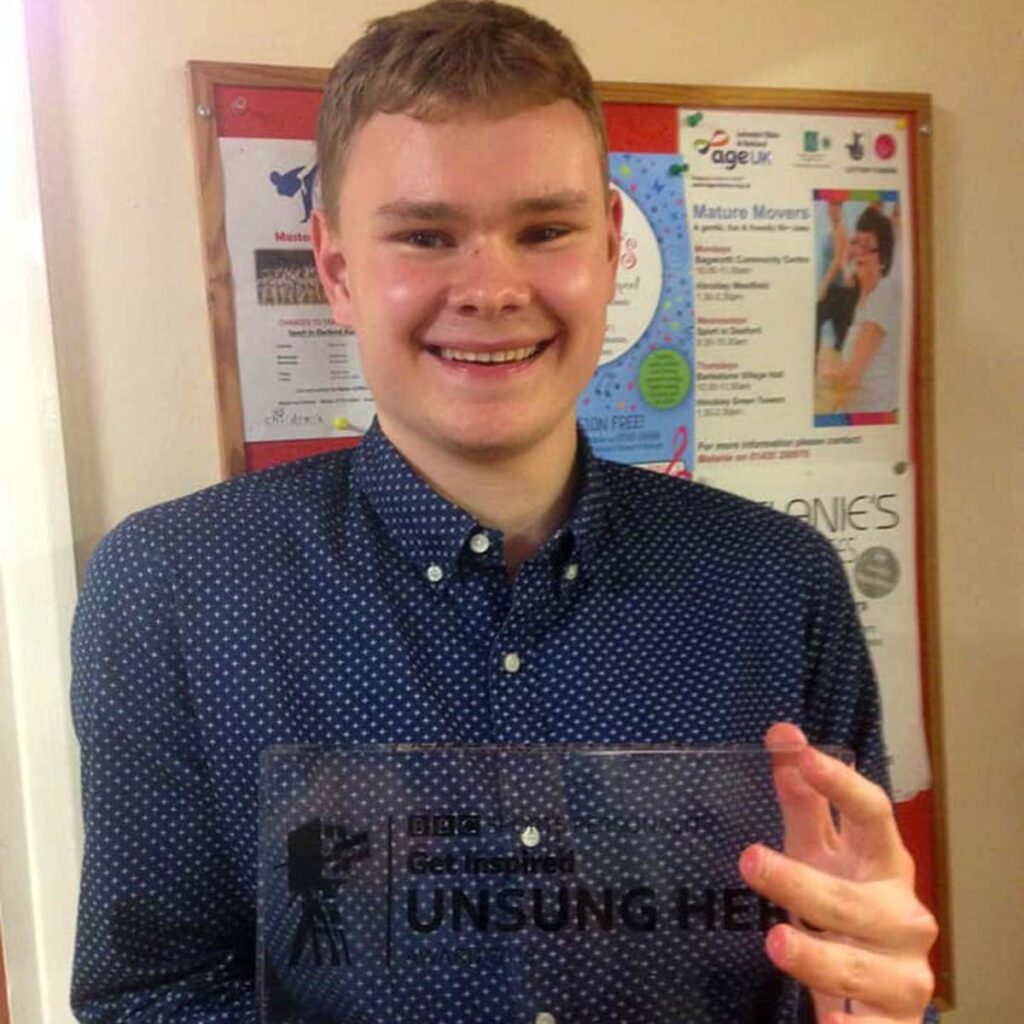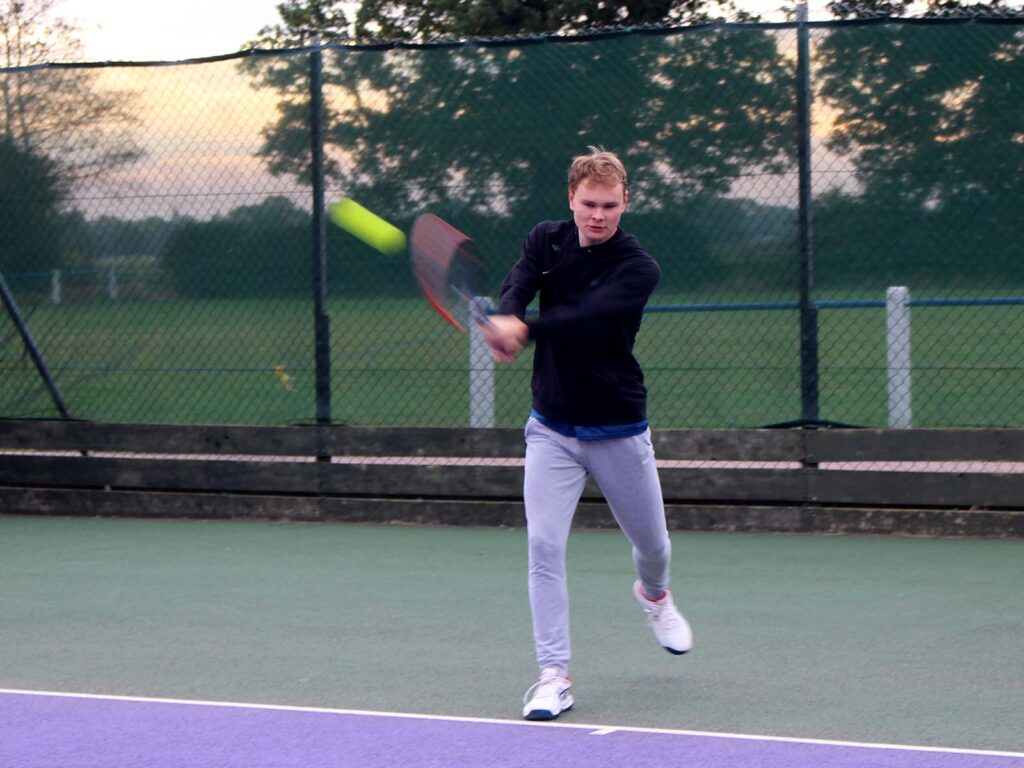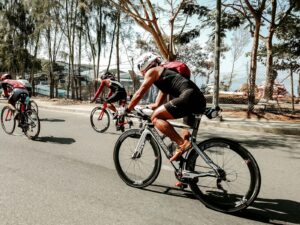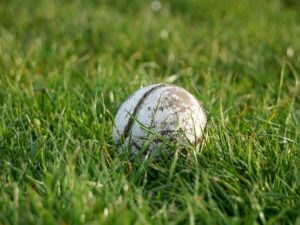Matt Chilvers: Coaching as a career

Matt Chilvers spent time playing football and learning how to swim in his youth, yet it was on the tennis court where his passion for sport really blossomed.
He first picked up a racket shortly after starting primary school, and since then he has never stopped playing. Now aged 25, he has taken part in several local and national competitions including events organised by the Tennis Foundation and Special Olympics.
But it was on Saturday mornings, when Matt was enjoying his first years as a teenager, that his life changed – the foundations of his future career in sport had begun to take shape.
It was at this time that he started attending tennis training as a volunteer coach rather than as a player, helping his coach Alec Matty to run sessions at Desford Lawn Tennis Club.
“It just exploded,” he said. “I decided that I wanted to do my Level One, and then Level Two.”
These tennis qualifications ran by the Lawn Tennis Association helped Matt develop into the award-winning coach that he has become.
The Level One course taught him some core coaching skills that enabled him to assist in the delivery of tennis sessions and progress on to Level Two training; a five-day course that gave him the skills and confidence to lead practices himself. By which point, he noticed that awareness of autism in sport had started to grow around the country.
Matt, who has autism himself, has played his part in continuing this growth and advocates that people with autism should feel free to take up sport.
“Go and find your local club. Sport is really good because it helps make you feel better about certain things.
“Success doesn’t have to be massive – hitting the ball over the net for the first time might make someone’s day and help them feel really proud of themselves. Small things that some might take for granted might be big for autistic people.
“I did research for my dissertation and I found lots of interesting findings about how people with disabilities are less active. They need to participate in sport to help them with physical health and mental health, and having fun and socialising are all really important.
“I’ve made lots of friends from sport, people I work with are really nice, and I get on with my tennis coach really well. And I also made friends from Special Olympics tournaments, which is nice too.
“The Paralympics has helped raise the profile of disability sport and that’s been really successful, and it might make people more aware of autism.”
It is no surprise that Matt also enjoys watching tennis when time allows. In September, he shared lots of social media posts about Emma Raducanu’s untouchable run to winning the US Open at just 18 years old, rising from number 150 to 23 in the world tennis rankings and exciting many sports fans around the world.
“I felt proud, and really inspired. If you have a goal, go and achieve it. I hope that leads to an increase in participation in tennis.
“I also saw Roger Federer live in a tennis match at the O2 Arena in London and it was a really great experience. I liked tennis before then but it was the first match I went to, and I was amazed at how good he was when he was playing.
“Then I went to Wimbledon for my 18th birthday and that was really good. I’d never seen that many people – I wasn’t sure if I would get used to crowds when I was younger but it came naturally.”
Matt has been taking his own steps in the limelight over the past few years.
“We need to make sure that all autistic people have positive experiences of sport, and you never know, that might lead to coaching.”
Matt Chilvers
He went to the BBC Sports Personality of the Year awards in 2018 as the winner of the Unsung Hero Award for the East Midlands, and more recently represented the National Youth Sport Forum and Activity Alliance at Wembley Stadium to discuss topics close to his heart.
“We talked about the barriers that people with disabilities face in participating in school sport and I shared my experience of that, and people came from the government to listen.
“I’d never been to Wembley Stadium before so it was really nice to go and it was a really big event. I’m just glad I make a difference and try to get the message out there.
“I would like to see clubs doing more taster days for people with disabilities and offering a relaxing environment where they can go and try the sport and there’s no pressure – ‘come down and have a go and speak to our coaches and find out about sport and why you should participate’.
“Things like transport, that’s a massive problem. Some schools can’t get transport to clubs, some people with autism struggle to drive which means they can’t get to places, some places aren’t within walking distance.
“The lockdown has made it harder as well; luckily after the lockdown I went straight back to sport, but some people might not want to and that’s them out of sport.
“We need to make sure that all autistic people have positive experiences of sport, and you never know, that might lead to coaching. It’s important that people see autism as a positive and can use it to do things, rather than let it stop them doing what they want to do in life.”
As well as making friends, Matt sees his autism as a confidence-builder.

After studying at Loughborough College – enrolling onto a Level Two education course and leaving seven years later with a university degree – he successfully applied for a part-time sports coaching role with North West Leicestershire District Council and started work at the end of this summer.
“There are children with disabilities who are quite young and have just come back from school and we put loads of sports equipment out and they come in and just have a go at what they want. We have basketball, football, tennis, loads of different sports.
“It’s really good to help them find what they want to do, taking the pressure off because they can decide. There’s more choice for them which is really nice.
“When I applied for North West Leicestershire they offered me the job which was really good, but some people don’t see the benefits of autistic people being employed in sport.
“We need more disability coaches and we need more awareness, so that organisations offer people interviews and make it easier for them to get a job in sport.”
Matt has shown how neurodiverse coaches can help disabled children have great experiences of sport by helping to coach at a local special school.
He is also a coach with Tennis Teacher in Market Harborough and believes organisations that start to employ more autistic coaches will inspire other companies to follow.
“There’s not many autistic coaches so it’s really good to be able to show that autistic people can coach.
“I make sure the pace is good, for the younger ones especially, making sure that I move on quickly when they find things easy and I do lots of games.
“Having my own group has really helped me because seeing what I can achieve by myself gives me confidence. I like how playing tennis helps to control my anxiety because when I’m playing I just forget about any worries I have and it makes me feel a lot happier and less stressed.
“You can take part in a sport and there’s also other ways to be involved, such as coaching, officiating, studying sport and so many other avenues. People shouldn’t have the pressure of feeling that they can’t do it.
“Everyone can achieve things and can participate in sport.”


